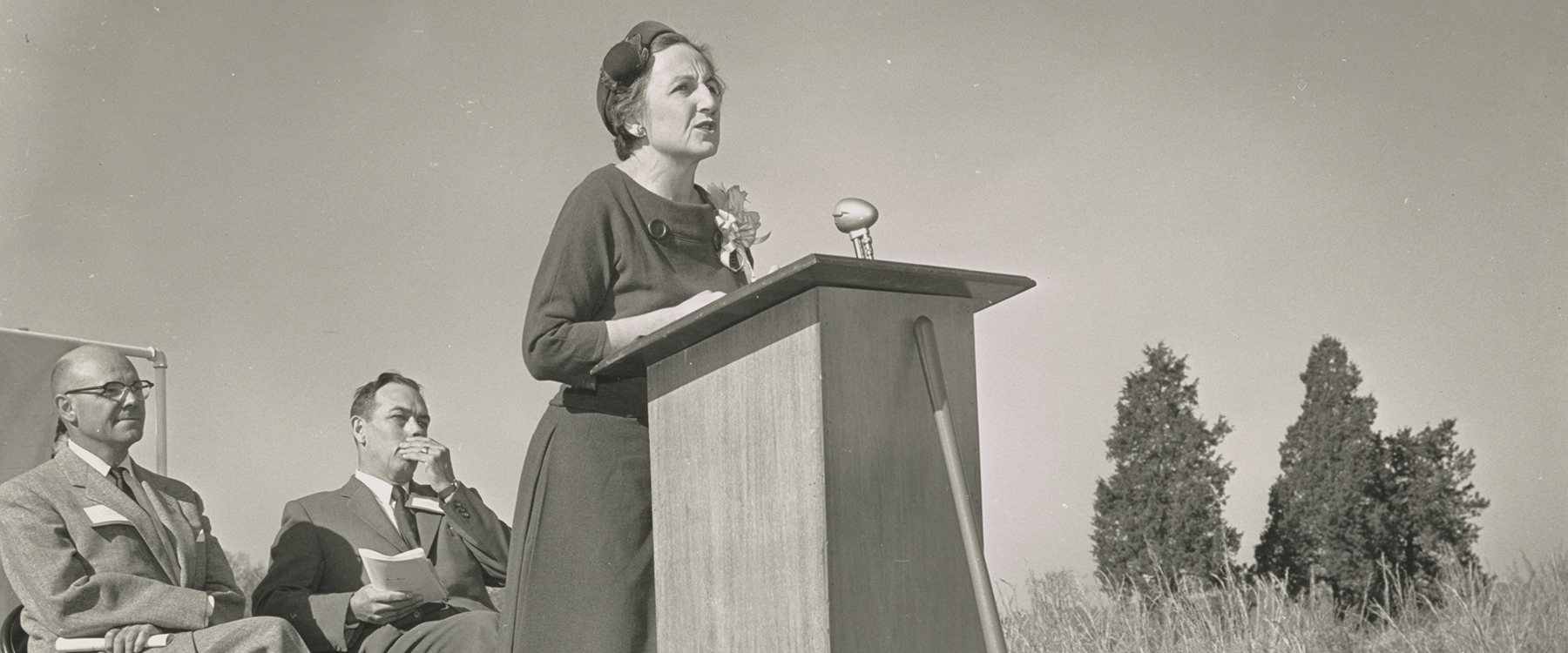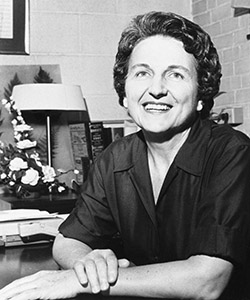
 Across the academic and administrative ranks at UNC Charlotte are female leaders who are tireless advocates for their students, faculty and staff members. Whether teaching, shaping policy or shifting campus culture, these women are dedicated and motivated to making positive change on the campus they love. It is a foundation of championship that Miss Bonnie Cone laid beginning with her tenure as director of what was then known as the Charlotte Center, and one that she continued to foster until her death in 2003.
Across the academic and administrative ranks at UNC Charlotte are female leaders who are tireless advocates for their students, faculty and staff members. Whether teaching, shaping policy or shifting campus culture, these women are dedicated and motivated to making positive change on the campus they love. It is a foundation of championship that Miss Bonnie Cone laid beginning with her tenure as director of what was then known as the Charlotte Center, and one that she continued to foster until her death in 2003.
“Bonnie Cone set the tone from the inception of UNC Charlotte,” said Fatma Mili, dean of the College of Computing and Informatics. “She envisioned a first-class higher education institution for the Charlotte region that is affordable, inclusive and accessible. She worked tirelessly with passion and conviction to realize this vision, and she served the institution for decades thereafter with passion, compassion and humility. Her style left a definite imprint on the DNA of the institution.”
Today, as we remember Miss Bonnie's legacy, several of UNC Charlotte’s current female leaders reflect on what it means to be a part of a University that values female leadership and their efforts to follow in the footsteps of the beloved Miss Bonnie. It’s their way of saying ‘thank you’ to the lady with whom 49er pride began.
Nancy Gutierrez, Dean of the College of Liberal Arts & Sciences
Miss Bonnie's energy is embedded within the University
"I remember the first time I read Bonnie Cone’s story. I felt incredibly fortunate to be working at an institution where its history is palpable and its future is full of promise, all because this woman could see her vision. She never came to work in a dairyfield because, even in the earliest of days, she saw her surroundings as a major university with a mission of transforming students’ lives, creating knowledge for the region and the world and partnering with the community to enact social good. Miss Bonnie’s energy and values permeate the institution. Consequently, I myself feel energized, as I strive to live up to her vision and build on it. That is the legacy of female leadership and its importance cannot be measured."
Fatma Mili, Dean of the College of Computing and Informatics
UNC Charlotte's culture and leadership style are what drew her to the University
“UNC Charlotte values equity, access and student success as its raison d’etre. UNC Charlotte values social responsibility and social justice and puts them at the core of its mission. Internally, UNC Charlotte is a place of cooperation and compassion. I am not sure if this is female leadership; it is the leadership that the times call for especially during times of crisis and transformation. We are privileged to have a great leader in Bonnie Cone, who set the tone for all of us.”
Catrine Tudor-Locke, Dean of the College of Health and Human Services
She learned as a child how to stand out as a leader and the importance of female mentorship
“In graduate school, I faced a new challenge as the only female in my male-dominated lab,” Tudor-Locke recalled. “My assigned male mentor and my male student peers played hockey together in a men’s league and went to the bar together afterward. I missed out on those serendipitous discussions, opened doors to opportunities and that unique form of camaraderie. Thereafter, I actively sought female mentors and, with their supportive guidance, discovered my own expanding scholarly capacity. Empowered by these female academic role models, I achieved a high degree of personal and professional success and ultimately developed a drive to become a better mentor and leader myself for others, men and women, in pursuit of their own career dreams and life aspirations. When I joined UNC Charlotte a year ago, I felt I had found my home: an institution founded by Bonnie Cone (a rule-breaker and world shaker in her own right) and one that embraces diversity, access and inclusion. I can assure you that Bonnie Cone’s spirit lives on because I find myself surrounded by like-minded people, many of them also female leaders, united in purpose to transform lives and build the next generation of mentors and leaders that our community, and the world, needs now.”
Jennifer Troyer, Dean of the Belk College of Business
UNC Charlotte fosters a sense of belonging
“Over my long career at UNC Charlotte, I am thankful for the mentorship and support I've received from female and male leaders alike. Early on, I received many signals of my value—some monetary, like pay raises and research grants—and some non-monetary, like invitations to grab coffee or lunch and invitations to participate in initiatives and research grants. For instance, shortly after joining UNC Charlotte, Chancellor Jim Woodward was interested in an analysis of gender pay equity among faculty, and I was invited to be part of the research team. He wanted data and was committed to acting on the data, which signaled his desire to make sure female faculty were paid equitably. I've always felt a sense of belonging here and that's not always the norm in higher education. While I did not know our founder, my sense from those who tell stories about her is that we can trace this culture of valuing talented women back to Miss Bonnie, who shaped this University through her determination, resourcefulness and pioneering spirit. These principles are at the core of who we are as a University today.”
Christine Reed Davis, Associate Vice Chancellor for Student Affairs and Dean of Students
Considers Miss Bonnie her role model
“The ways in which UNC Charlotte upholds its value of and commitment to women in leadership positions is extremely important to me. By supporting women in the enhancement of their leadership skills and experiences, the institution cultivates an environment that empowers me to feel confident in speaking up, challenging the status quo,and developing my own style of cooperative leadership. Over the years, Miss Bonnie has served as a strong role model for me to follow in being true to one’s self and vision, even in the face of societal adversity and the idea that outspoken leadership is not a woman’s place. I am grateful that the University has kept her legacy alive and continues to value the strengths that female leadership brings to every table.”